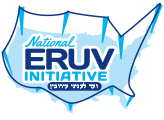I t is the philosophy of The National Eruv Initiative that the Eruv Leadership should actively fundraise. Having ample funds has a direct relationship to the quality of the Eruv and its repairs. It is very difficult to maintain a community Eruv. Eruvin should be educating and informing the general community on Eruv happenings, as well as utilizing fundraising strategies to increase cash flow. A long term fundraising goal should be the focus. Community Eruvin need to prevent and deal with the mistaken notion that once the eruv exists, little has to be done to keep the Eruv up.
t is the philosophy of The National Eruv Initiative that the Eruv Leadership should actively fundraise. Having ample funds has a direct relationship to the quality of the Eruv and its repairs. It is very difficult to maintain a community Eruv. Eruvin should be educating and informing the general community on Eruv happenings, as well as utilizing fundraising strategies to increase cash flow. A long term fundraising goal should be the focus. Community Eruvin need to prevent and deal with the mistaken notion that once the eruv exists, little has to be done to keep the Eruv up.
With proper funding, Eruvin can…
- Have checkers who are well versed in the relevant Halachos (Laws)
- Build the Eruv using materials and construction methods that will make it reliable
- Make repairs
- Avoid Shailas (questionable construction methods)
- Prevent the Eruv from being down and needing an emergency repair
- Correct errors in Eruv construction
- Have inspection regularly by an expert
- Have regular tree trimming
- Have paid checkers
- Have multiple people capable of checking
- Reroute the Eruv at will
- Invest in tools
- Have someone available to make repairs on Friday afternoons
- Make improvements regularly
- Have a strong website
- Organize events to spread Eruv awareness
Most of the above list are prerequisites for a Kosher Eruv and should be a priority. However, without proper funding, much of the above list will not happen.
Many people are willing to donate to the Eruv because they know their Shabbos would be significantly different without an Eruv. However, people need to be reminded to give, and they may even need to be taught about the expenses that are involved in the upkeep of the eruv. Hence, giving the community reminders and easy methods to donate should be a priority. If the Eruv Leadership does not have the ability to fundraise (because of lack of time or energy), they should hire someone to do the work.
Pitfalls of only having fundraising through a website and/or a yearly solicitation letter…
- When large expenses come up, people start to question “The Eruv has always been fine, so what changed?”
- You only make repairs which without those repairs the Eruv is Pasul (invalid), which lowers the Kashrus of the Eruv.
- You make efforts to minimize costs of repairs which will result in shoddy repairs. Weaker repairs run the risk of the Eruv being damaged easily and Pasul, as well as needing frequent checking and repairing. Investing in stronger repairs takes more money upfront, but will likely save the community more money in the long term.
- You have volunteer checkers. Some potential challenges of volunteers are 1) they won’t remain checking for many years, 2) you cannot be selective in who is checking because you are dependent on who is gracious enough to donate their time, 3) they may not feel a deep responsibility to do their checking which may translate in neglecting of their responsibilities, 4) their level of knowledge about the relevant Halachos are significantly less compared to someone who is paid to check (because you can be more selective), and 5) the Eruv Leadership is regularly searching for volunteers.
- You hesitate to (and usually won’t) bring in an expert Posek to examine the eruv. Hilchos Eruvin are complex and regular involvement of experts is the only way to have a Lechatchila Kosher Eruv.


